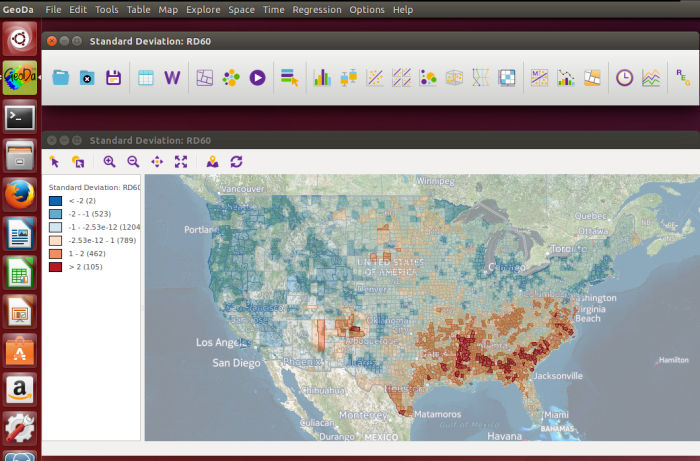GeoDa is a free software package that conducts spatial data analysis, geovisualization, spatial autocorrelation and spatial modeling. It’s designed to offer new insights from data analysis by exploring and modeling spatial patterns.
GeoDa has powerful capabilities to perform spatial analysis, multivariate exploratory data analysis, and global and local spatial autocorrelation. It also performs basic linear regression. As for spatial models, both the spatial lag model and the spatial error model, both estimated by maximum likelihood, are included.
GeoDa was first released in 2002 by the NSF-funded Center for Spatially Integrated Social Science. It built upon a long history of software development for spatial analysis.
Features include:
- User-friendly and graphical interface to methods of exploratory spatial data analysis (ESDA), such as spatial autocorrelation statistics for aggregate data (several thousand records), and basic spatial regression analysis for point and polygon data (tens of thousands of records)
- Add multiple file formats like shapefile, GeoJSON, KML, SQLite and table format (CSV, XLS and DBF).
- Converts coordinates in table format (.csv, .dbf, .xls, .ods) to one of these spatial data formats and converts data between different file formats (such as .csv to .dbf or shapefile to GeoJSON).
- Cross-platform support – runs under Linux, Mac OS X, and Windows.
Website: geodacenter.github.io
Support: Documentation, GitHub Code Repository, YouTube videos
Developer: Dr. Luc Anselin and his team.
License: GNU General Public License v3.0

GeoDa is written in C++. Learn C++ with our recommended free books and free tutorials.
| Popular series | |
|---|---|
| The largest compilation of the best free and open source software in the universe. Each article is supplied with a legendary ratings chart helping you to make informed decisions. | |
| Hundreds of in-depth reviews offering our unbiased and expert opinion on software. We offer helpful and impartial information. | |
| The Big List of Active Linux Distros is a large compilation of actively developed Linux distributions. | |
| Replace proprietary software with open source alternatives: Google, Microsoft, Apple, Adobe, IBM, Autodesk, Oracle, Atlassian, Corel, Cisco, Intuit, SAS, Progress, Salesforce, and Citrix | |
| Awesome Free Linux Games Tools showcases a series of tools that making gaming on Linux a more pleasurable experience. This is a new series. | |
| Machine Learning explores practical applications of machine learning and deep learning from a Linux perspective. We've written reviews of more than 40 self-hosted apps. All are free and open source. | |
| New to Linux? Read our Linux for Starters series. We start right at the basics and teach you everything you need to know to get started with Linux. | |
| Alternatives to popular CLI tools showcases essential tools that are modern replacements for core Linux utilities. | |
| Essential Linux system tools focuses on small, indispensable utilities, useful for system administrators as well as regular users. | |
| Linux utilities to maximise your productivity. Small, indispensable tools, useful for anyone running a Linux machine. | |
| Surveys popular streaming services from a Linux perspective: Amazon Music Unlimited, Myuzi, Spotify, Deezer, Tidal. | |
| Saving Money with Linux looks at how you can reduce your energy bills running Linux. | |
| Home computers became commonplace in the 1980s. Emulate home computers including the Commodore 64, Amiga, Atari ST, ZX81, Amstrad CPC, and ZX Spectrum. | |
| Now and Then examines how promising open source software fared over the years. It can be a bumpy ride. | |
| Linux at Home looks at a range of home activities where Linux can play its part, making the most of our time at home, keeping active and engaged. | |
| Linux Candy reveals the lighter side of Linux. Have some fun and escape from the daily drudgery. | |
| Getting Started with Docker helps you master Docker, a set of platform as a service products that delivers software in packages called containers. | |
| Best Free Android Apps. We showcase free Android apps that are definitely worth downloading. There's a strict eligibility criteria for inclusion in this series. | |
| These best free books accelerate your learning of every programming language. Learn a new language today! | |
| These free tutorials offer the perfect tonic to our free programming books series. | |
| Linux Around The World showcases usergroups that are relevant to Linux enthusiasts. Great ways to meet up with fellow enthusiasts. | |
| Stars and Stripes is an occasional series looking at the impact of Linux in the USA. | |
